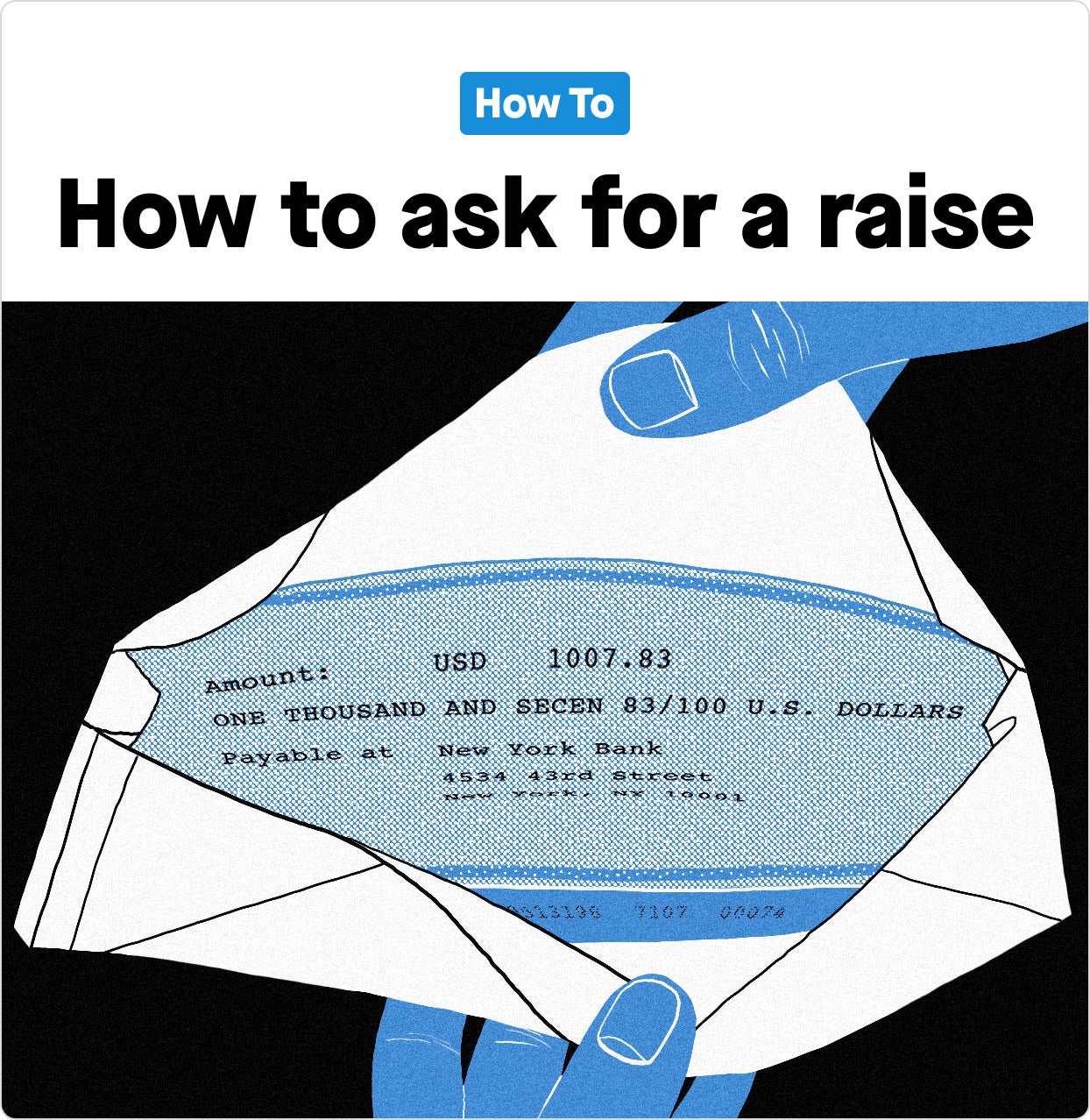✦ How to ask for a raise
There’s work to be done, and by golly you’re doing it. No matter what barriers the pandemic has put in your way, no matter how many of your colleagues around you quit for greener pastures, you’ve stuck it out, picking up the slack where needed, performing day in and day out, grinding.



There’s work to be done, and by golly you’re doing it. No matter what barriers the pandemic has put in your way, no matter how many of your colleagues around you quit for greener pastures, you’ve stuck it out, picking up the slack where needed, performing day in and day out, grinding.
You think you deserve to be compensated for that hard work. That is: You deserve a raise.
But even those among us who feel we most deserve a raise can be reluctant to broach the subject simply out of discomfort. A 2017 survey of 1,000 full-time office workers found that though 90% of people thought they deserved a raise, just 44% planned to ask for one. Some things they’d rather do instead included: get a root canal, be audited by the IRS, or even look for another job.
It doesn’t have to be this way. You can go into that meeting with your boss and ask for the raise you deserve with confidence. Read on for some practical tips for how to ask for more money.
Ask yourself: Do I deserve this raise?
It’s got nothing to do with your personal finances. The main question is: how have you been performing? If the answer is “not great,” due to a loss of motivation or whatever else, perhaps it’s best to work on that in order to make a better case for a raise in the future.
To evaluate your performance, you have to have a pretty good sense of the expectations for your role, and confidence that you’re surpassing them. To have a proven track record, you should probably spend six months or more in your role before asking for a raise, except in truly exceptional circumstances.
If a lot of people have been leaving your company recently or if your job has shifted, it might also be a good time to look around and determine what the company actually needs, even if that is outside the responsibilities you were hired to perform. “Go to your boss and say, ‘How can I contribute, what do you need, what’s going to make this company more successful?’” Karen Coffey, a career advisor who’s worked with employees at companies like Bank of America and Walt Disney, told my colleague Sarah Todd. Then, “find a way to fulfill it.”
Do your homework
That is, quantify your contributions. Maybe you helped retain clients, or added new subscribers to a company’s newsletter. Keep track of it for a few weeks or longer.
Documenting your achievements will not only make your case more compelling, it’ll also help your boss go to bat for you. “You have to do the heavy lifting to make it as easy as possible for them to make it happen,” Romy Newman, co-founder of Fairygodboss, a site that helps women navigate the workplace, told my colleague Nico Rivero.
🍾 Come up with a number
Are you overpaid or underpaid for your industry based on your skill set? This isn’t a time to guess. Review the number of job openings in your field using tools like CareerBuilder or other job sites. Even if you’re happy in your job with no plans to leave, check for shifts in the job market quarterly. Go to industry events. Talk to people in your network about what they’re seeing and what skills are generating top dollar. Maybe even ask your coworkers. These discussions will help you gauge your worth and close any skills gaps to ensure you remain marketable.
Kit Warchol, former editor of the career advice site Career Contessa, suggested coming up with three different salary figures. “Think of an ideal number, where if you get it you’ll pop champagne; an in-between number that will make you feel respected; and then think of a number where if they wouldn’t give you this much, you’d think about finding another job.”
Have the conversation
Set up an appointment with your boss to discuss the raise. Experts offer conflicting advice about whether to give your boss a heads up about the topic or not—while some say it’s best not to catch them by surprise (they suggest sending an email that says “I’m hoping to have a conversation about my performance and compensation. When can we do this?”), others think some managers will use that extra time to come up with reasons why you shouldn’t be paid more. Personally, I’ve had luck when I haven’t disclosed the nature of the meeting in advance, but do what feels right for you.
So you’re in the meeting—what do you say, exactly?
- Explain why you’ve called this meeting, if they don’t know already.
- Talk yourself up. This is the time to share that data you’ve compiled on your contributions.
- Make the ask. There are a few ways to do this:
- You could ask for a range—if you’re looking for a 15% raise, ask for 15%-20%.
- One tried-and-true method is: “I would like to make $X. What would it take for me to get there?” You might then elaborate with follow-up questions: Would it mean adding extra duties? Changing roles? Improving some aspect of the way I work now?
- Discuss next steps (more on that next).
Be realistic about what happens next
It’s very unlikely that you’ll get an answer right away—your boss probably needs to ask their boss. Share the data you’ve compiled on your performance to help them advocate for you, and set up another time to check in about this.
If the answer is no, don’t take that as a sign that you shouldn’t ask again. Ask for feedback on your performance and what it will take to get you the raise the next time around.
If there simply isn’t room in the budget to bump up your salary, ask when you can revisit the issue, “If they say it’s not a good time—okay, then when is a good time? Is three months a reasonable time? Six months? How can we get this accomplished?” Newman says. In the meantime, consider asking for other perks, like extra vacation time, the chance to attend a professional conference, a better desk or parking space, a gym membership, or a title change.
Finally, if your employer isn’t compensating you fairly and refuses to do so, it might be time to look for another job.
Keep learning
- Before you ask for a raise, take time to hone this skill (Quartz)
- Every step you need to take to get a raise (Quartz)
- How to ask for a raise, according to three experts and a chatbot (Quartz)
- How to ask for the salary you want with zero risk of sounding obnoxious (Quartz)
- Can you still ask for a raise in a pandemic? (Quartz)
Have a great weekend,
—Alex Ossola, membership editor (once made a slideshow to successfully ask for a raise)
With contributions from Sarah Todd, Lila MacLellan, Nico Rivero, and Paul McDonald
One 🤖 thing
Want to talk through the decision of whether or not to ask for a raise? We made a bot for that back in 2019. Give it a try.